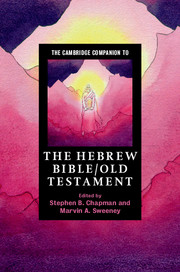Book contents
- Frontmatter
- Contents
- List of Tables, Maps, and Figures
- List of Contributors
- List of Abbreviations
- Introduction
- Part I Text and canon
- Part II Historical background
- 3 The ancient Near Eastern context
- 4 The history of Israelite religion
- 5 The Hebrew Bible and history
- Part III Methods and approaches
- Part IV Subcollections and genres
- Part V Reception and use
- Index
- Cambridge Companions to Religion (continued from page iii)
- References
3 - The ancient Near Eastern context
from Part II - Historical background
Published online by Cambridge University Press: 05 July 2016
- Frontmatter
- Contents
- List of Tables, Maps, and Figures
- List of Contributors
- List of Abbreviations
- Introduction
- Part I Text and canon
- Part II Historical background
- 3 The ancient Near Eastern context
- 4 The history of Israelite religion
- 5 The Hebrew Bible and history
- Part III Methods and approaches
- Part IV Subcollections and genres
- Part V Reception and use
- Index
- Cambridge Companions to Religion (continued from page iii)
- References
Summary
During the nineteenth and early twentieth centuries, archaeologists began to recover the lost societies of the ancient Near East from Egypt, Mesopotamia, Syria, Anatolia, Persia and the Levant. Many texts were unearthed in these digs, but at first the languages were unknown and the texts could not be read. Scholars managed to decipher the ancient scripts in a relatively short time, thanks to linguistic brilliance and the discovery of two multi-language texts, the Behistun Inscription of Darius (which permitted scholars to decipher the Akkadian script of Mesopotamia) and the Rosetta Stone (which permitted the same for Egyptian hieroglyphs). The feat of decipherment was so great that some of the world's best scholars doubted its accomplishment; these sceptics turned out to be wrong.
The texts from Mesopotamia had the most sensational effects in Europe and America. During the 1870s, scholars published Akkadian literature that was closely connected to the Bible. Some of these texts, which referred to Israel, Judah and their kings, were heralded as proof of the Bible's historicity and accuracy, but other texts created certain problems. Notable in this regard were Enuma Elish, the Gilgamesh Epic and the Sargon Birth Legend, which were, respectively, similar (for many, uncomfortably similar) to the creation story in Genesis, the biblical flood story and the story of Moses’ birth. These texts appeared to undermine the supposed uniqueness of the Bible as the divine word. Some influential scholars began to think of Israel and its Bible as merely one small part of ancient Babylonian culture. Strong tensions soon emerged between the new field of Assyriology, which was discovering and publishing these new texts, and the field of Biblical studies, which was largely influenced by conservative Judaism and Christianity. The tensions persist to this day in some quarters of scholarship.
The ‘pan-Babylonian’ and ‘parallelomania’ approaches tended to assume that every similarity between Israelite and Mesopotamian literature was a result of borrowing from Mesopotamia. For some, this meant that the writers of the Bible were reading and copying Mesopotamian texts, whereas others thought that the Bible reflected a degenerate memory of the more ancient and impressive Mesopotamian tradition. Scholars soon realized, however, that these theories offered deficient accounts of the matter.
- Type
- Chapter
- Information
- Publisher: Cambridge University PressPrint publication year: 2016



